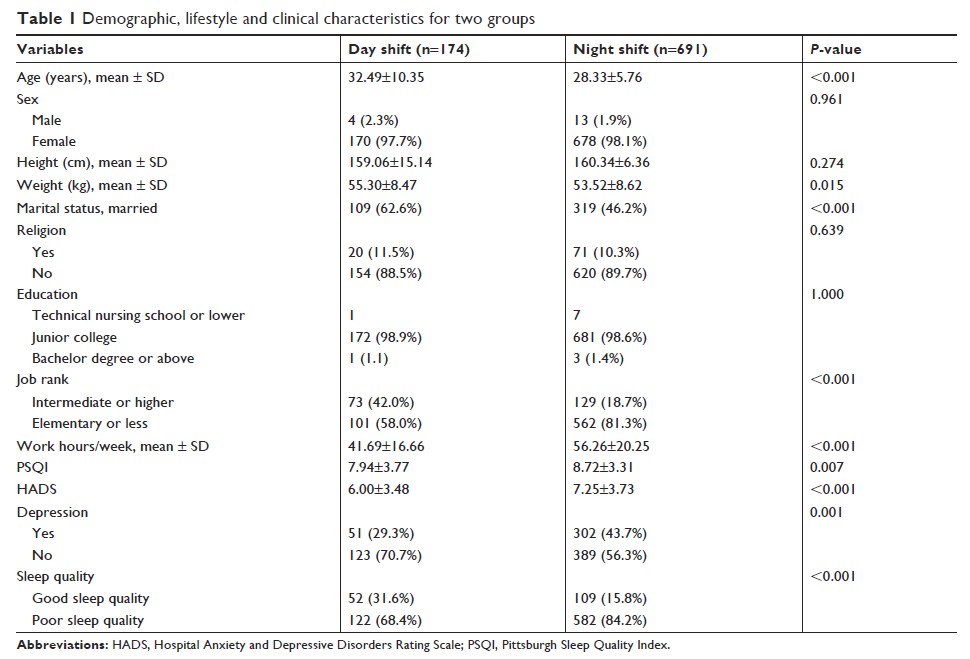108605
论文已发表
注册即可获取德孚的最新动态
IF 收录期刊
- 3.4 Breast Cancer (Dove Med Press)
- 3.2 Clin Epidemiol
- 2.6 Cancer Manag Res
- 2.9 Infect Drug Resist
- 3.7 Clin Interv Aging
- 5.1 Drug Des Dev Ther
- 3.1 Int J Chronic Obstr
- 6.6 Int J Nanomed
- 2.6 Int J Women's Health
- 2.9 Neuropsych Dis Treat
- 2.8 OncoTargets Ther
- 2.0 Patient Prefer Adher
- 2.2 Ther Clin Risk Manag
- 2.5 J Pain Res
- 3.0 Diabet Metab Synd Ob
- 3.2 Psychol Res Behav Ma
- 3.4 Nat Sci Sleep
- 1.8 Pharmgenomics Pers Med
- 2.0 Risk Manag Healthc Policy
- 4.1 J Inflamm Res
- 2.0 Int J Gen Med
- 3.4 J Hepatocell Carcinoma
- 3.0 J Asthma Allergy
- 2.2 Clin Cosmet Investig Dermatol
- 2.4 J Multidiscip Healthc

夜班对中国护士睡眠质量和抑郁症状的影响
Authors Dai C, Qiu H, Huang Q, Hu P, Hong X, Tu J, Xie Q, Li H, Ren W, Ni S, Chen F
Received 12 October 2018
Accepted for publication 17 January 2019
Published 7 February 2019 Volume 2019:15 Pages 435—440
DOI https://doi.org/10.2147/NDT.S190689
Checked for plagiarism Yes
Review by Single-blind
Peer reviewers approved by Dr Andrew Yee
Peer reviewer comments 2
Editor who approved publication: Dr Jun Chen
Purpose: Night
shift is associated with adverse physical and psychological health outcomes
such as poor sleep quality and depressive symptoms. We aimed to compare sleep
quality as well as depressive symptoms in nurses working night shifts to those
working day shifts only and explore the association between sleep quality and
depressive symptoms among nurses.
Patients and methods: Eight
hundred sixty-five nurses were enrolled in the current study. Sleep quality and
depressive symptoms among nurses were evaluated by the Pittsburgh Sleep Quality
Index (PSQI) and Hospital Anxiety and Depressive Disorders Rating Scale (HADS),
respectively.
Results: PSQI and
HADS scores were both significantly higher in the nurses working night shifts (P <0.05) than in
those working day shifts only. Besides, there was a positive correlation
between PSQI and HADS scores. Binary logistic regression showed that night
shift and poor sleep quality were independent risk factors of depressive
symptoms among nurses.
Conclusion: Higher
rates of depression among Chinese nurses working night shifts may be associated
with poor sleep quality induced by night shift.
Keywords: nurse,
depression, night shift, sleep
